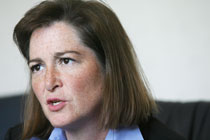
MC: What is going to make your tenure different?
BM: If I can achieve one thing it is to reduce violent crime. It is extremely important. We’ve seen the recent rash of killings and shootings but its nothing new. We’ve had violent crime in our community for a long time. What I want to do is take a comprehensive approach to it. It is not enough just to aggressively enforce the law and lock people up. We’ve been doing that for a long time and you can see that doesn’t work. Its part of the equation, but I think prevention and community trust also need to be part of that plan.
MC: But that’s very rare for a top law enforcement official like yourself to say that locking up people has not worked. It’s a shift of the pendulum.
BM: Maybe so but I don’t know. There are other people in this community who share that view. I have been meeting with community leaders, Chief Evans at the police department, Kym Worthy at the Wayne County Prosecutor’s Office. We are all doing a lot of little things but let’s get ourselves all together to the table and make sure we are doing all we can do to not only aggressively enforce the laws against violent crime but in terms of prevention. Crime is just a symptom of underlying problems. Our economy has suffered and so when people have a lack of job opportunity, educational opportunity crime is a symptom of that. If we can have intervention in schools, re-entry programs for offenders who are coming out of prisons and give them some opportunities so they don’t just go back to their old associates and habits that would be a productive thing. That’s something that we are working on.
MC: On the question of Aiyana Jones, the 7-year-old killed by a police bullet, will the Justice Department do anything on that case?
BM: Right now we are still monitoring the situation. There is an internal process for reviewing a situation like that with the Michigan State Police and they are looking at it, and we are waiting to see what results come out of that. And if we reach a point where we are not satisfied with the result of that investigation then we would certainly intervene. That’s another example of why community trust is so important and why police relationships with the community is so important. We need to make sure it doesn’t happen again. We need to make sure our police practices are consistent.
MC: How would the police department do that within the context of being under a Justice Department monitor?
BM: Yes, we do have a consent degree in place with the Detroit Police Department. They have remedied some of the egregious practices that existed previously, like locking up witnesses. They solved some of the bigger problems but it moved slowly in terms of making real progress like in-car cameras. They help the police officer, they help prosecutors and they help citizens to hold police officers accountable for what really happens in a police situation. Having a database that will flag when an officer is involved in incidents that result from complaints from citizens. If we are successful we can improve the way policing is done in Detroit. But I think the current police department and the current mayor are very committed, the deputy mayor, Saul Green…I have confidence in their ability to get it done.
MC: Your critics say you lost the Carl Marlinga case, the Geoffrey Fieger case. How do you as the new U.S. Attorney rise in the face of that kind of criticism?
BM: You know we certainly deserved to be criticized. I will always take it, accept it and try to use it to do better. We can’t be afraid to take hard cases and from time to time we are going to lose. And that is what I want to tell our prosecutors because I don’t want them to be so gun-shy that they are afraid to bring a case that they think there is some risk of losing because sometimes you have to be brave and willing to take a hit. But the thing that we are doing differently to try to improve is we’re putting together teams of people to vet our cases before indictment and before trial. So we are trying to improve our success.